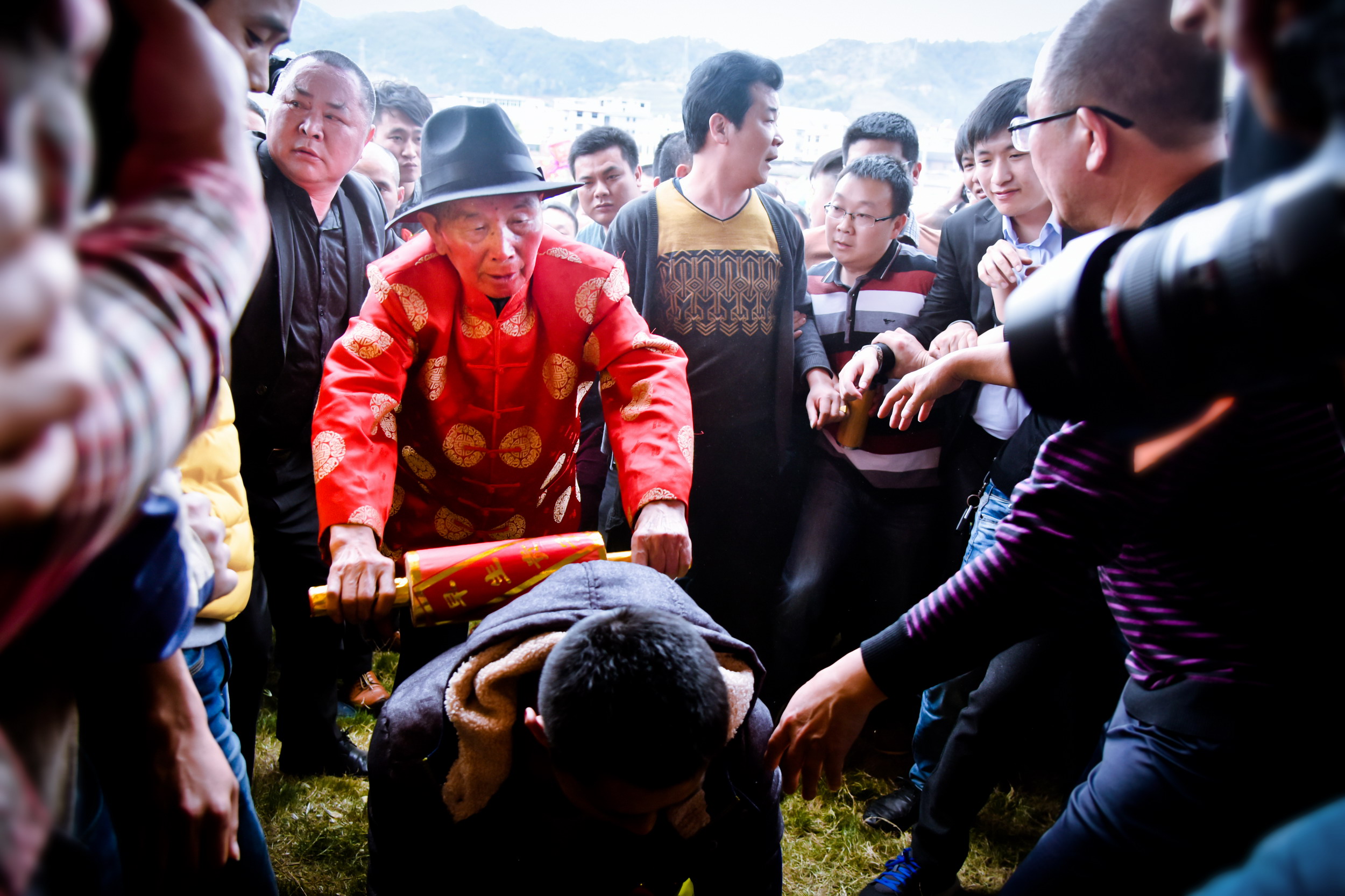
Getting married
In Kanshi Town, Yongding, Longyan, this custom of "getting married" is the most auspicious ceremony for the local Hakka people. On the 11th day of the first lunar month every year, the newlyweds of the previous year gather in front of the tomb of their founding ancestor, Mrs. Lin, and are "beaten" by the highly respected elders of the clan with their staffs. It is said that if this young couple is hit by a rolling pin the following year, their wish will come true and they will have a chubby baby.
The coffin vanished, leaving behind a feng shui treasure land
When it comes to this special custom, we cannot fail to mention the founding ancestor of the Lu family in Kanshi, Mrs. Lin. It is said that this elderly man was of high moral standing and his funeral was held on the 11th day of the first lunar month.
It was raining heavily at that time. When the descendants and relatives who were seeing them off were carrying the coffin halfway, they were blocked by the heavy rain. The helpless crowd had no choice but to temporarily lay down the coffin and take shelter. Unexpectedly, after a rain, the old lady's coffin was gone! The local people believed that the place where the coffin would stay must be a rare feng shui site. Therefore, the old lady, having a spirit, chose her final resting place by herself.
This story sounds full of supernatural elements and is clearly fabricated by later generations. However, there is no doubt that Mrs. Lin is over a hundred years old. Moreover, she has many descendants throughout her life. In the eyes of the world, she is already considered wealthy. Since then, every year on the 11th day of the first lunar month, the local area has gathered the newlyweds of the previous year and gathered them in front of the old lady's grave to collectively "get married", praying for the early birth of a noble son and the presence of a man and a woman. This custom has been passed down to this day and has a history of more than 500 years.
The legacy of female ancestral worship
The annual "wedding ceremony" is the highlight of Kan City, and the local people naturally do not take it lightly. According to the grand sacrifice ceremony in the festival, the people of Kan City will prepare whole pigs and whole sheep to the standard of "Shao Lao".
To better align with the theme of "fertility", they would insert cypress branches into the sheep's mouths and noses, symbolizing the flourishing of cypress trees with their branches and leaves. Meanwhile, stuffing rape flowers or fresh flowers blooming in the fields of the current season into the pig's mouth symbolizes blooming and bearing fruit.
What's special is that it's already astonishing to hold auspicious ceremonies in front of a cemetery, not to mention that this is a female cemetery. The unconventional custom of "getting married" in Kan City, which originated in the feudal society where men were superior to women, sounds rather inconceivable. However, we can seek the answer from the source of history - there are still many remnants of the Minyue culture in the land of Fujian to this day, and the worship of female ancestors is one of them. With this explanation, the practice of ";getting married" among the Hakka people in Kanshi is no longer bizarre.
As soon as the afternoon arrived, the newlyweds of the previous year gathered in front of Mrs. Lin's grave. At this moment, the highly respected elder of the clan was invited out, and the "wedding ceremony" officially began.
The rolling pin ";beats" out joy
The first couple surnamed Lu to get married last year are called "newlyweds". Before the ceremony begins, they will lead the rest of the men and women to bow down to their ancestors, symbolizing not forgetting their roots. Subsequently, the lion dance team and the gong and drum team took the stage one after another. Amidst the lively sounds of firecrackers, the entire clan paid homage to Mrs. Lin.
When the firecrackers went off again, the elder waved a rolling pin in his hand, dropped it from the left shoulder of the newlyweds, and then gently rolled it to the right shoulder, still reciting auspicious words like "Have a noble son on the left and a noble son on the right." At this moment, take a look at this special rolling pin, which has been wrapped and decorated with festive red paper, with auspicious characters such as "Have a Son soon" written on it - it stands out particularly when placed on the shoulders of the newlyweds.
The elder who "hits others" must be a fortunate person elected by the clan, highly regarded by all, and with many descendants. If the elder happens to be fond of cracking jokes, that would be an even better choice. At this moment, he could still have a little drink and pretend to be drunk - shaking his head, swaying his body and staggering along, which could push the lively atmosphere on the spot to its peak in no time.
The more shy new brides would always pretend to run away when they saw them. The elders had no choice but to run after them, panting heavily. This often made the onlookers burst into laughter and let out a series of "ha ha" sounds, which was very primitive and wild.

 Hakka wedding customs-Cultural activities-Fujian Tulou Yongding Scenic Area
Hakka wedding customs-Cultural activities-Fujian Tulou Yongding Scenic Area